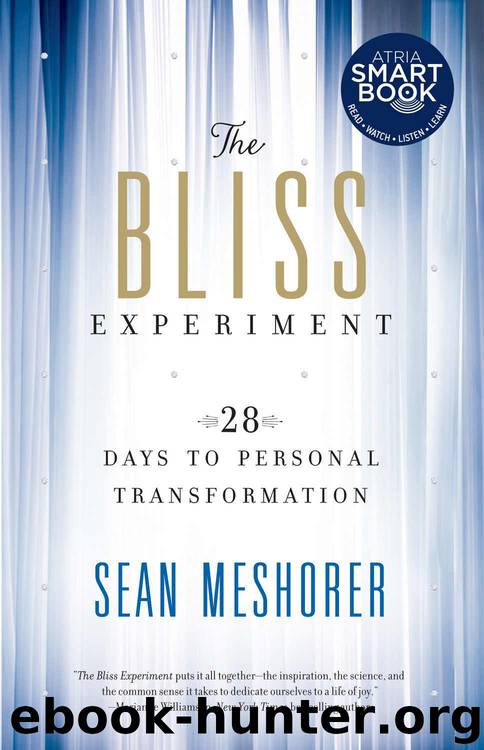The Bliss Experiment: 28 Days to Personal Transformation by Meshorer Sean

Author:Meshorer, Sean [Meshorer, Sean]
Language: eng
Format: azw3
Publisher: Atria Books
Published: 2012-05-07T16:00:00+00:00
What Is Gratitude?
Put simply, gratitude is the conscious remembrance of something positive that we either experienced in the past or are experiencing now. That’s pretty much it. We reflect on our lives and make an effort to remember what’s going right or has gone right. It can be something good that’s happened, a positive quality of ours or someone we know, an enjoyable experience we’ve had, or something interesting, beautiful, helpful, or positive happening in this now-moment.
Gratitude transforms our negative passivity into positive activity; it awakens and uplifts our consciousness. Too often we drift through our lives as if in a reverie. Things happen all around us, but we barely notice. We become so acclimated to our jobs, material objects, relationships, and situations that we cease to focus on or enjoy them. We take our lives—and everything and everyone in them—for granted.
Gratitude, then, is about bolstering our awareness, sensitivity, and attention. Earlier, in our discussion of awareness and being fully present in the moment, we explored how awareness, when understood and approached properly, leads to a positive fullness, as opposed to a dispiriting emptiness. When we are positively centered in the moment, gratitude is often the dominant feeling. We are noticing and filling our conscious awareness with appreciation. This kind of active, positive attentiveness generates a greatly heightened awareness.
There is nothing artificial or false about this. Gratitude is the practice of observing or remembering the truth. It isn’t a denial or fantasy. If your boyfriend is short, gratitude isn’t pretending he’s tall. Nor does it require you to deny that his height is a negative (if it is for you, that is). Instead it’s remembering to balance this “negative” with his positive qualities. He may be short, but he’s handsome, or kind, or smart. Whatever it may be. Practicing gratitude also assists us in contextualizing and diluting negative thoughts—even accurate ones—by drowning them in a sea of positive ones. Gratitude vigorously asserts the fullness of reality by filling our awareness with positive truth.
Gratitude does not require denying unpleasant things. Elie Wiesel doesn’t practice gratitude by denying the Holocaust. But he makes sure that in his daily life, the grief and horror are contextualized; he never forgets to also remember and even savor all of the good he’s experienced. If Wiesel can find reasons to be grateful, then we all can.
Download
This site does not store any files on its server. We only index and link to content provided by other sites. Please contact the content providers to delete copyright contents if any and email us, we'll remove relevant links or contents immediately.
Daring Greatly by Brene Brown(6501)
You Do You by Sarah Knight(4464)
The Confidence Code by Katty Kay(4250)
Ikigai by Héctor García & Francesc Miralles(4238)
He's Just Not That Into You by Greg Behrendt & Liz Tuccillo(3889)
The Courage to Be Disliked by Ichiro Kishimi & Fumitake Koga(3478)
Toxic Parents by Susan Forward(3281)
Make Your Bed by William H. Mcraven(3171)
Self-Esteem by Matthew McKay & Patrick Fanning(3136)
365 Days of Wonder by R.J. Palacio(2828)
The Gaslight Effect by Dr. Robin Stern(2790)
The Gifts of Imperfection by Brene Brown(2559)
Dare to Lead by Brené Brown(2442)
The Charisma Myth: How Anyone Can Master the Art and Science of Personal Magnetism by Cabane Olivia Fox(2424)
The Modern Alpha Male: Authentic Principles to Become the Man You Were Born to Be: Attract Women, Win Friends, Increase Confidence, Gain Charisma, Master Leadership, and Dominate Life - Dating Advice by Patrick King(2339)
How to Own Your Own Mind by Napoleon Hill(2290)
Parisian Charm School by Jamie Cat Callan(2287)
The Year of the Introvert by Michaela Chung(2283)
How to Make Small Talk by Melissa Wadsworth(2243)
